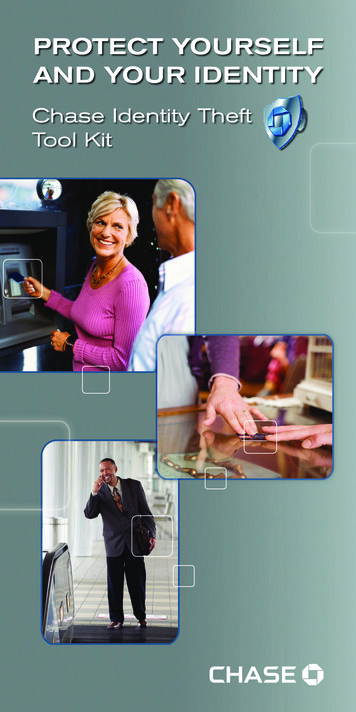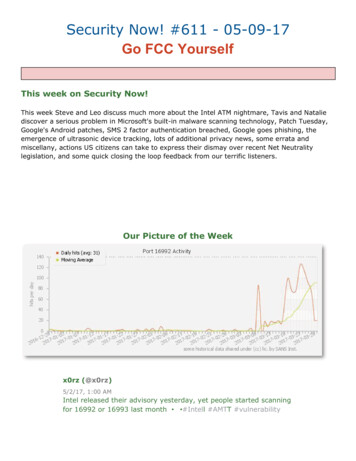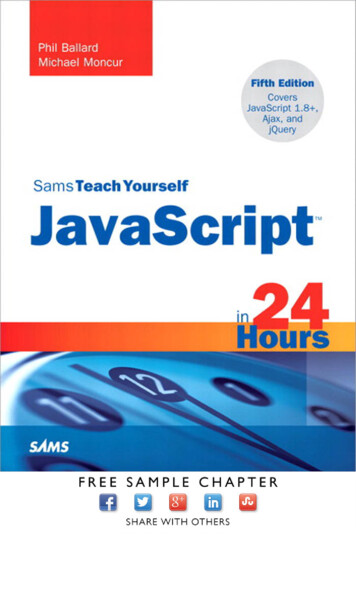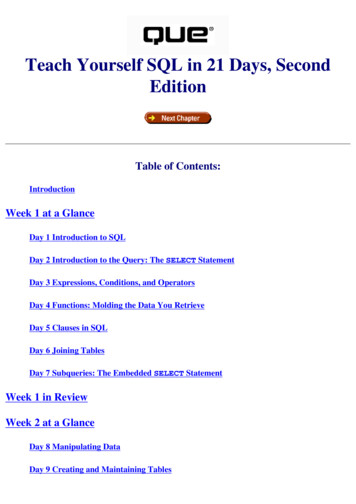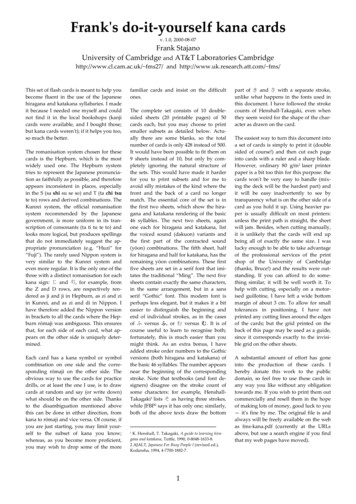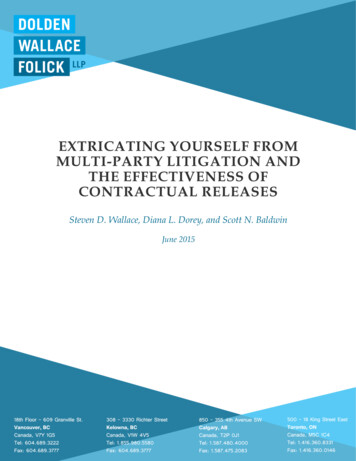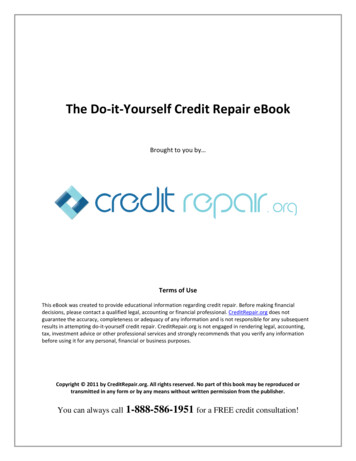
Transcription
The Do-it-Yourself Credit Repair eBookBrought to you by Terms of UseThis eBook was created to provide educational information regarding credit repair. Before making financialdecisions, please contact a qualified legal, accounting or financial professional. CreditRepair.org does notguarantee the accuracy, completeness or adequacy of any information and is not responsible for any subsequentresults in attempting do-it-yourself credit repair. CreditRepair.org is not engaged in rendering legal, accounting,tax, investment advice or other professional services and strongly recommends that you verify any informationbefore using it for any personal, financial or business purposes.Copyright 2011 by CreditRepair.org. All rights reserved. No part of this book may be reproduced ortransmitted in any form or by any means without written permission from the publisher.You can always call1-888-586-1951 for a FREE credit consultation!
INDEX1. CREDIT SCORES, CREDIT REPORTS & RELATED LAWS1.1 Your Credit Score1.2 Your Credit Report1.3 Obtaining reports and scores1.4 Understanding Your Credit Report333341.5 What to Do With Your Credit Report61.6 What Hurts Your Report?1.7 How Long Does Bad Credit Stay on Your Record?1.8 Laws to Know During Credit Repair and Beyond6782. ADDING POSITIVE INFORMATION TO YOUR REPORT2.1 Pay On-Time, Every Time2.2 Stop Overspending2.3 Using Credit Limit Increases to Help Your Credit Score101010102.4 Preventing Inquiry Negatives2.5 Getting a Co-Signer to Improve Your Score2.6 Get a Secured Credit Card2.7 Diversify Your Credit Report111212133. REMOVING NEGATIVE INFORMATION FROM YOUR REPORT3.1 How Credit Report Disputes Repair Your Credit3.2 Negotiate with Creditors Directly3.3 No Reply on a Dispute141415173.4 Dispute a Consumer Dispute3.5 What is a Charge Off?3.6 Pay for Delete3.7 Removing Public Records from your Report3.8 Using Debt Validation1818192020Page 2 of 21
1. CREDIT SCORES, CREDIT REPORTS & RELATED LAWS1.1 Your Credit ScoreYour credit score is the numeric summary or “grade” for the information in your credit report.Credit scores range from 300 to 850 (the higher the better) and aren’t automatically includedwith your credit report, but you can order them separately. Your credit report directlyinfluences your credit score with positive reporting from your creditors helping your score andnegative information hurting your score.1.2 Your Credit ReportYou may have an idea about what your credit report contains but you’d be surprised to findthat there can be errors on your report. You should order copies of all three of your credithistories from the major reporting bureaus Equifax, Experian, and TransUnion. Every individualhas the right to receive one free copy of each annually from annualcreditreport.com. You canalso get a free report for up to 60 days if you have been denied credit.1.3 Obtaining reports and scoresCredit reports and credit scores can cost money. If you’re ordering them frequently throughoutthe credit repair process, you can easily spend over a hundred dollars. Good thing there areplaces that you can get your credit report and credit score for free or inexpensively.AnnualCreditReport.comThis is a website through which you can order the free credit reports that you’re entitled to byfederal law. To make sure you’re taking advantage of this right, you must order our credit score through FreeCreditScore.com can be acquired for free which is based on yourExperian credit report. But to do so you must be enrolled in a trial subscription to a creditmonitoring service. Failing to cancel within seven days will result in a monthly credit cardcharge.Page 3 of 21
myFICO.comThe only place you can get a free FICO score, the score most commonly used by lenders, isthrough myFICO.com. There’s a catch, though. To get your free FICO score, you must sign up fora trial subscription to Score Watch, a credit score monitoring service. If you don’t cancel – youguessed it – your credit card will be charged.CreditKarma.comHere, you can get a free credit score without having to enter any credit card number. You don’thave to enroll in a trial subscription and you don’t have to cancel anything to avoid beingcharged. The score is your TransUnion credit score which is based on data from that creditreport. An advantage this site offers is you can order an updated credit score through CreditKarma as often as you’d like, for free.Quizzle.comQuizzle gives you access to both your credit report and credit score – for free. There’s no creditcard required and you don’t have to cancel a subscription to anything. They don’t even needyour social security number. Both the credit report and score are based on your data atExperian. You can get a free credit score and report from Quizzle twice a year.1.4 Understanding Your Credit ReportYour credit report contains all the information that determines whether you have a good or badcredit score. When you receive each report, go over every single line of information and checkfor accuracy. Any information that is not correct should be reported back to the credit bureauusing the online or printed forms provided. The bureaus are required to investigate all reportedinaccuracies and if the creditor does not cooperate, the information may be dropped from yourreport. Unfortunately, credit reports aren’t the most intuitive documents. When you’rechecking your credit report for the first time, you may be confused about the layout and theinformation that’s being reported.Some credit reports are easier to understand than others. The simplest ones use different fontsand colors to separate the sections. Those that are harder to understand usually use atypewriter-looking font, include codes, and use little spacing.Most credit reports sections are laid out in the same order.Page 4 of 21
Personal information lists your name, name variations (e.g. if you’ve been married orsometimes use a middle initial), current and previous addresses, phone number, date of birth,entire or last four digits of your social security number, and employer.The summary section varies by credit report but typically gives a highlight of the negativeinformation on your credit report, like the number of negative accounts and the total amountpast due. The summary section may also provide information about your total credit age andsum amount of credit card and loan balances.The largest section of your credit report lists details about all your credit accounts individually.For each credit card, loan, collection account, etc. the same basic information is reported: Information about the creditorStatus of the account, e.g. whether you’re current or past dueDate the account was openedLast time the account was updatedType of account, e.g. installment, revolving, collection, etc.Monthly paymentType of account responsibility, e.g. joint, individual, or authorized userCredit limit or original loan amountHigh balance (this is the highest balance charged on the account)Current balanceLast paymentAccount history for the past seven yearsYour personal statement for the accountPublic records include things like bankruptcy, repossession, foreclosure, and judgments that areon file with a court system.Inquiries are added to your credit report whenever a business requests to see your creditreport. Some inquiries are added because of your applications for credit. These “hard” inquiriesare on all your credit reports and are used to calculate your credit scores. Other inquiries aredone by you, employers, existing creditors, and businesses that want to pre-approve you. These“soft” inquiries only show up on your credit report and are not used to calculate your score.Reading about what’s in your credit report doesn’t fully help you understand your credit report.Fortunately, there are a few tutorials out there provided by the same people who put yourcredit report together. Here are a few sample credit reports: Experian, myFICO, TransUnion.These samples are especially helpful when you order your credit report from one of those threeproviders.Page 5 of 21
1.5 What to Do With Your Credit ReportAnalyze every bit of information listed on the credit report, including your name, address, SocialSecurity number, and all account information. Any information that is inaccurate should bejotted down for later reference. Each credit bureau will have an online or printed form whereyou can list incorrect information. All consumer requests must be investigated by the creditbureau once they have been received. Investigations can change the status of the reportinformation if found to be false. In some cases, the creditor will not comply with the request forinformation and subsequently the incorrect data will be dropped from the report. By updatingand correcting information, your report will reflect a more accurate picture of your financialhealth and be an asset for you when applying for new credit, looking for a new job, renting ahome, and even getting insurance quotes.1.6 What Hurts Your Report?Recent delinquenciesRecent delinquencies, especially 90 day payments, can adversely affect your score. Paymenthistory is 35% of your credit score, so late payments can take their toll on your credit score.Charge-offs, debt collections, bankruptcies, repossession, foreclosure, lawsuit judgments, andtax liens also fall under the payment history portion of your credit score.Any unpaid billAny unpaid bill can become a serious delinquency, even if it’s not a credit card or loan. Manybusinesses now send even the smallest debts to a collection agency if that debt goes unpaid.Since collection agencies almost always add debts to your credit report, a 5.00 library fine or a 35 phone bill can end up on your credit report and hurt your scores.Maxed-out credit card balancesThe second-most important part of your credit score includes your credit card and balances.The closer your credit card balances are to your credit limit, the worse it is for your credit score.The same thing goes for any loan balances. If you have loan balances that are over or close tothe loan amount, your credit score will be hurt. Many experts recommend using no more than30% of your allotted credit extension to improve and maintain your credit score.Page 6 of 21
Closed accounts that still have balancesIt’s common for people to close their credit cards simply because they’re upset with the creditcard company or because they don’t want the temptation of the credit card anymore.Unfortunately, this doesn’t hurt the credit card company, but it does hurt your credit score.Once your credit card is closed, your credit limit is usually reported as 0. If your credit card hasa balance, it looks like you’ve maxed-out when all you’ve really done is closed the account.Too many recent credit applicationsInquiries count for 10% of your credit score. Your score takes a hit whenever you put in severalcredit card or loan applications. Each time you apply for credit, an inquiry is placed on yourcredit report. Ten percent doesn’t sound like much, but that means too many inquiries can costyou 65 points on a 650 credit score.Newly opened credit accountsFifteen percent (15%) of your credit score is based your credit age. This includes the amount oftime since you opened your first account and the average age of all your credit accounts.Opening a new account lowers your average credit age and can hurt your credit score.1.7 How Long Does Bad Credit Stay on Your Record?You may have had a few bad months or even a few bad years when debt got out of hand andfinancial obligations became uncontrollable. After missing three or four payments on yourcredit card accounts or other bills, your credit report will begin to reflect negative paymentinformation and your credit score will begin its decent. As a general rule, 7 years is the length oftime a credit report will show an accurate negative mark but it is more complex than that. Hereare the exceptions to the 7-year rule of credit reports:BankruptcyIf you have filed for bankruptcy, the information will be reported on your credit history for thefollowing 10 years.Tax LiensIf you had a lien filed against you for taxes owed to the government, the information willremain on your credit history report for 7 years from the date you paid the debt.Page 7 of 21
Loan DefaultIf you default on a loan with the U.S. government or a guaranteed student loan the informationcan be reported for 7 years after the guarantor takes action.LawsuitsJudgments against you in a lawsuit can be reported to your credit history for seven years or forthe period specified in the statute of limitations, whichever is longer.1.8 Laws to Know During Credit Repair and BeyondDid you know there are laws that protect your rights before, during, and even after creditrepair? Repairing your credit requires you to work with giant companies who have a lot moremoney than you. These companies would have complete power over the credit repair process,if the government hadn’t put a few rules in place to keep these companies in check. The lawisn’t perfect and some companies find loopholes, but knowing the law can help you get results.Fair Credit Reporting ActThe FCRA is a law that generally dictates what can and can’t appear on your credit report. TheFCRA says that inaccurate, incomplete, unverifiable, or outdated information can’t be listed onyour credit report. You have the right to dispute credit report errors either with the creditbureau or the company that listed the information on your credit report. It was an amendmentto the FCRA in 2003 that entitles you to your annual credit reports through the federallymandated AnnualCreditReport.com.Fair Credit Billing ActThe FCBA was created to help consumers correct billing errors from credit card companies.Billing errors include unauthorized charges to your credit card, unposted payments, or chargesfor merchandise that weren’t received as promised. You have 60 days from the date of thebilling error to make a dispute directly to the credit card company and the credit card companymust investigate the dispute. In the meantime, you don’t have to pay for the disputed chargesand you can’t receive any penalty when you don’t pay.Fair Debt Collection Practices ActThe FDCPA is a law that dictates what debt collectors can and cannot do when they’re collectinga debt from you. There’s a long list of things they can’t do. For example, they can’t call youbefore 8 a.m. or after 9 p.m., they can’t call if you’ve already told them it’s an inconvenienttime, and they can’t call you at work if you’ve told them your employer doesn’t approve thosePage 8 of 21
calls. They can’t tell certain people about your debt, but can get location information from yourfriends, neighbors, and relatives.Credit Repair Organizations ActThe CROA was created to protect consumers from unscrupulous credit repair agencies. Scamsstill happen, but many dishonest credit repair companies are caught and charged by the FederalTrade Commission. Credit repair companies can’t lie about the services they provide you,they’re not supposed to charge you upfront, and they can’t ask you to do anything illegal to“repair” your credit. If a credit repair company violates your rights, you can sue them forpenalties and damages.If you have a complaint against any business you’ve dealt with during the credit repair process,you can report them to the FTC by visiting www.FTCcomplaintassistant.gov or you can call 1877-FTC-HELP. You can also report these businesses to your state Attorney General or localBetter Business Bureau.You can always call1-888-586-1951 for a FREE credit consultation!Page 9 of 21
2. ADDING POSITIVE INFORMATION TO YOUR REPORT2.1 Pay On-Time, Every TimeWhile no one is completely sure of the mathematical equation used to calculate credit scores, itis certain that the way you pay your bills has a big impact on your credit score. If you are 30, 60,90 days or more late with payments on bills that report back to the credit bureaus, you will seea drop in your credit scores. If you are consistently late, you risk having accounts closed and thenegative information being reported on your credit reports for years to come. It is never toolate to start getting on track. Automate your payments to make it less likely you will be late ormiss making payments. Over a six month time period of perfect bill paying, you can see anincrease in your credit score.2.2 Stop OverspendingIf you want to improve your credit score and history, stop overspending on credit. If you maxout your credit cards or take them over the credit limit, your score will drop. Ideally, you shouldnever charge something you can’t afford to pay in cash, but obviously this isn’t always practical.To help improve your credit, use your cards for purchases you are sure you can pay off in fulleach month.2.3 Using Credit Limit Increases to Help Your Credit ScoreOne strategy you may use to help improve your credit score is to get a credit limit increase. Byincreasing your credit limit, you will not only lower your credit utilization for that specific creditcard, but you’ll also lower your total credit utilization. The more credit limit increases you get,the better your credit score will be.Two Ways to Get a Credit Limit IncreaseSome credit card issuers grant credit limit increases automatically after you’ve used your creditcard responsibly for a certain period of time. You might notice an automatic credit limitincrease after charging a certain amount on your credit card then paying it off. Automatic creditincreases are unpredictable, so you can’t exactly wait for the credit card issuer to give you anincrease if you’re actively trying to repair your credit.Page 10 of 21
You can also apply for a credit limit increase with your credit card issuers. The process is simple.Call your credit card issuer using the number on the back of your credit card and ask for yourcredit limit to be increased. If your card issuer asks how much of an increase you’re looking for,keep it reasonable. Too high of an increase may be automatically denied. For example, if youhave a 1,000 credit limit already, it’s more reasonable to ask for an increase to 5,000 than 10,000. Your request may be processed over the phone or the creditor may send a letterletting you know the decision.How Credit Limit Increase Requests Can BackfireSome credit card issuers actually do a credit check when you request a credit limit increase. Ifthe card issuer does a “soft pull” of your credit report, you have nothing to lose from requestinga credit limit increase since soft credit inquiries don’t affect your credit score and can only beseen when you check your own credit report. On the other hand, your credit card issuer may doa “hard pull” which does show up on your credit report and will affect your credit score for thenext 12 months.The negative effect of an additional credit inquiry could negate any benefits your credit scorewould get from the additional credit limit. And if your credit limit increase is denied, then yourcredit score has taken a hit and you’ve benefitted nothing.So, before you request a credit limit increase from your credit card issuers, ask whether they’llbe doing a hard or soft pull of your credit report. Let them know you’re concerned about theimpact on your credit score and request they use a soft pull, if possible.2.4 Preventing Inquiry NegativesAs mentioned, you should never impulsively apply for credit or turn in multiple creditapplications in a short period of time. With so many inquiries counting against you in one time,additional creditors pulling your report will likely be concerned about all of your recent creditapplications and be less inclined to approve a loan or line of credit. They will consider you toomuch of a risk and not responsible with your credit. Additionally, your credit score will drop afew points with each hard inquiry an
Credit scores range from 300 to 850 (the higher the better) and arent automatically included with your credit report, but you can order them separately. Your credit report directly influences your credit score with positive reporting from your creditors helping your score and negative information hurting your score. 1.2 Your Credit ReportFile Size: 664KB




